One common issue that many of us face is inflammation, which can manifest in our bodies in various ways, from joint pain to digestive discomfort. While there are pharmaceutical options available, nature has provided us with an arsenal of herbs that have remarkable anti-inflammatory properties. These herbs not only taste great but also help us in our battle against inflammation. Let’s delve into the world of herbs that are champions when it comes to soothing inflammation and boosting overall well-being.
- Turmeric: The Golden Wonder
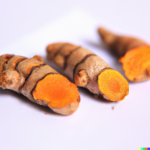
Kicking things off with the superstar of anti-inflammatory herbs – turmeric! This bright yellow spice, commonly used in Indian cuisine, contains curcumin, a potent anti-inflammatory compound. Studies have shown that curcumin can help reduce inflammation by blocking certain enzymes in the body. It’s no wonder that turmeric has been used for centuries in traditional medicine to treat various ailments, including arthritis and digestive issues. To incorporate more turmeric into your diet, consider adding it to curries, soups, or even a soothing cup of turmeric tea.
- Ginger: A Zesty Remedy

Ginger, with its spicy and aromatic flavor, isn’t just a favorite in the culinary world; it’s also a powerful anti-inflammatory herb. Gingerol, the active compound in ginger, has been shown to reduce inflammation and ease symptoms in conditions like osteoarthritis. You can enjoy ginger’s benefits by adding it to stir-fries, smoothies, or simply steeping ginger slices in hot water for a soothing ginger tea.
- Holy Basil: Nature’s Stress Buster

Holy basil, also known as Tulsi in India, is a herb revered for its potent anti-inflammatory and adaptogenic properties. This herb helps the body adapt to stress, which can often trigger inflammation. Holy basil contains compounds like eugenol and ursolic acid, which can reduce inflammation and boost your immune system. Consider sipping on tulsi tea or incorporating fresh holy basil leaves into salads or dishes for a flavorful anti-inflammatory punch.
- Rosemary: The Herb of Remembrance
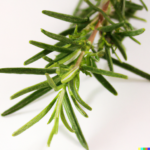
Rosemary, a fragrant herb often associated with Mediterranean cuisine, offers more than just a burst of flavor. It contains rosmarinic acid, which has anti-inflammatory and antioxidant properties. Rosemary can be used to season a variety of dishes, from roasted vegetables to grilled meats, and can even be steeped in hot water for a refreshing herbal tea.
- Cinnamon: Spice Up Your Life

Cinnamon, known for its warm and comforting aroma, is not only delightful in baked goods but also has anti-inflammatory properties. Cinnamaldehyde, a compound in cinnamon, has been shown to reduce inflammation and improve insulin sensitivity. Sprinkle cinnamon on your morning oatmeal, add it to smoothies, or enjoy it in a cup of spiced chai for a delicious way to combat inflammation.
- Cayenne Pepper: Heat Things Up
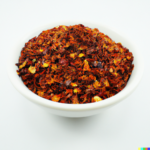
If you enjoy a little spice in your life, cayenne pepper might be your go-to herb for reducing inflammation. Capsaicin, the active component in cayenne pepper, can help alleviate pain and reduce inflammation by inhibiting the substance P (yes, it’s really called P), which is a neurotransmitter that transmits pain signals. Just a pinch of cayenne pepper can add a fiery kick to your dishes and give your metabolism a boost.
- Chamomile: Calm Inflammation and Your Nerves

Chamomile, known for its calming and soothing properties, can also help combat inflammation. Its antioxidants, including apigenin, have anti-inflammatory effects. Chamomile tea is a popular choice for relaxation, and sipping on a cup before bedtime can help reduce inflammation and promote better sleep.
- Green Tea: Sip Your Way to Health
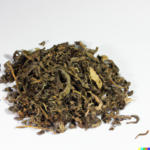
Green tea is more than just a refreshing beverage; it’s a powerhouse of antioxidants and anti-inflammatory compounds. Epigallocatechin gallate (EGCG), a polyphenol in green tea, has been extensively studied for its anti-inflammatory effects. Enjoy a cup of green tea daily to harness its myriad health benefits, including reduced inflammation.
- Peppermint: A Cool Solution
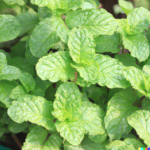
Peppermint isn’t just a refreshing flavor; it also has anti-inflammatory properties. Menthol, a compound found in peppermint, can help relax muscles and ease inflammation, making it an excellent choice for soothing digestive discomfort. Sip on peppermint tea or add fresh mint leaves to your salads and beverages for a refreshing twist.
- Lavender: Aromatic Relief

Lavender, known for its delightful aroma and calming effects, can also help combat inflammation. Lavender essential oil, when applied topically, can soothe skin inflammation, while inhaling its scent can reduce stress-induced inflammation. Consider using lavender oil in aromatherapy or adding fresh lavender buds to recipes for a touch of flavor and calm.
So, to sum it up… Inflammation is a common foe on our journey to better health, but nature has generously provided us with a diverse array of herbs to combat it. From the golden hue of turmeric to the spicy kick of cayenne pepper, these herbs offer not only flavor but also relief from inflammation-related discomfort. Incorporating these herbs into your daily life, whether through culinary creations or herbal teas, can help you on your path to a healthier, inflammation-free you. So, spice up your meals, brew some herbal teas, and let nature’s warriors lead you to a life with less inflammation and more vitality!
Enjoy! (Images and verbiage are AI-assisted.)
Kathy

Kathy is an herbalist/naturopathic practitioner who is constantly researching to expand her knowledge. She came to herbalism after her migraine medicine was suddenly removed from the market and she had to find something new. After discovering the magic of herbs she’s never looked back. She is accredited by the International Practitioners of Holistic Medicine (IPHM) and is an Associate Member of the American Herbalist Guild.

Kathy is an herbalist/naturopathic practitioner who is constantly researching to expand her knowledge. She came to herbalism after her migraine medicine was suddenly removed from the market and she had to find something new. After discovering the magic of herbs she’s never looked back. She is accredited by the International Practitioners of Holistic Medicine (IPHM) and is an Associate Member of the American Herbalist Guild.